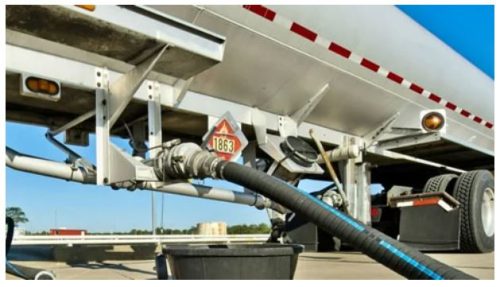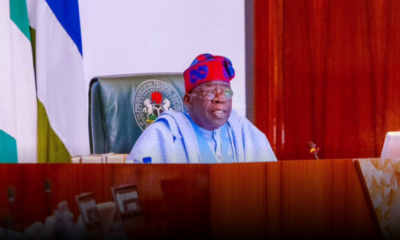Barely 24 hours after the price of aviation fuel rose by 35 percent from N430/liter to N580/liter, oil marketers on Wednesday predicted that the price of the product might hit N700/liter by next week if the global crude oil price continued to fluctuate.
The National Operations Controller, Independent Petroleum Marketers Association of Nigeria, Mr. Mike Osatuyi, who dropped the hint in an exclusive interview with our correspondent, said the Russia-Ukraine war and other related factors might fuel further increases in the prices of aviation fuel and other petroleum products.
Aviation fuel, also known as Jet A1, which sold for N190/liter and later N360/liter in January this year, rose to between N579 and N607/liter on Tuesday.
Oil marketers, as well as airport officials, said the aviation fuel was sold for different prices across the nation’s airports.
In Lagos, Jet A1 was sold for N579 per liter on Tuesday; Abuja N599, Port-Harcourt N599; and Kano N607. A few weeks ago, aviation fuel marketers had increased Jet A1 to about N450 per liter which forced the carriers to raise airfares by 100 percent.
The latest hike in aviation fuel however came with a scarcity of the product, forcing virtually all the carriers to reschedule flights while others who could not get Jet A1 canceled flights.
The domestic terminals of the Lagos and Abuja airports, as well other airports across the country were filled as restless passengers besieged airline check-in counters. Several passengers were stranded.
The Chief Operating Officer of Ibom Air, Mr. George Uriese, had decried the situation, saying the latest increase in Jet A1 price had put domestic carriers in a very tight situation.
He said, “Something has to give way at this time, which I don’t know”. He felt perhaps airlines might be forced to change their business models if the situation persisted.
However, speaking on Wednesday, the IPMAN national operations controller, Osatuyi said airlines might need to brace for further increases in the price of Jet A1 due to the high exchange rate, among other factors.
Osatuyi said, “Well, the sharp increase we are seeing in crude price is a correspondingly a sharp increase we are also recording in the prices of aviation fuel and other petroleum products. Prior to the Ukraine-Russian crisis, over two weeks ago, crude was still around $100 and $105 per barrel. But as of today, crude is around $139-$140 per barrel; that is about a 40 percent increase. You can see that on the aviation fuel, it went up from about N450/liter to about N570 per liter; that is a huge increase.
And you have to know this: We buy diesel, kerosene, and aviation fuel through the black market. The marketer will also pay for the oil vessel at the black market rate and the exchange rate is also at the black market rate. So, you pay cash to people who are bringing in these products. So, the prices of these petroleum products go in line with the price of crude oil. I am sure that by next week, marketers will start bringing in vessels at $140 per barrel.
“So the hike goes in hand with the increase in the price of crude oil. By next week, don’t be surprised we are hitting N700. The exchange rate today is N585 while the official rate is N416; and the government does not give forex allocation for the purchase of kerosene, diesel, and aviation fuel.”
Meanwhile, the President of the Aircraft Owners and Pilots Association of Nigeria, Alexander Nwuba, said the price of aviation fuel went up because it is a deregulated product.
“Importers are business people; jet fuel does not fall under subsidy so they have to pass their cost to consumers. I only know that they are responding to market conditions, they changed their prices and everything has gone up, diesel is almost closely marking Jet fuel, diesel has gone up, and now jet fuel”
According to him, importers have to recover the cost of importation as the product does not fall under subsidy.
“The prices have to go up because it is not subsidized by the government, so whoever that is importing has to recover the cost and make a tiny bit of profit. The subsidy doesn’t cover jet fuel. Nigerians don’t consume jet fuel, they pay for it through the airfares. Before the hike, airfares constitute about 40 to 50 percent of airlines’ cost of operations which they pass on to the consumers. Now that the price of aviation fuel is almost doubled, it means that jet fuel now constitutes up to 60 to 70 percent of the operating cost of the airlines. You still have other cost increases across the board. Handling charges have gone up at the airports, and a number of other things have gone up. Naturally, what happens is that airlines will adjust their prices to the operating cost in other to make a profit and they are still complaining that they are not making profits”
Also speaking, the Chief Executive Officer, Centurion Aviation Security, and Safety Consult, John Ojukutu, said that aviation fuel should not be sold at less than N500/liter.
“As of the time we were selling aviation fuel for N200/liter, it was going about $3-$4 per gallon in the United States; if you translate, that it is about N2,000. So, I have been saying that aviation fuel shouldn’t be sold less than N400 to N500 per liter, we are just facing the reality. Have you forgotten that we are importing? We don’t refine it here! If we are refining it here, it would have been a different thing, we are importing it.”

 BIG STORY3 days ago
BIG STORY3 days ago
 BIG STORY5 days ago
BIG STORY5 days ago
 BIG STORY4 days ago
BIG STORY4 days ago
 BIG STORY5 days ago
BIG STORY5 days ago
 BIG STORY23 hours ago
BIG STORY23 hours ago
 BIG STORY4 days ago
BIG STORY4 days ago
 BIG STORY2 days ago
BIG STORY2 days ago
 BIG STORY3 days ago
BIG STORY3 days ago






















